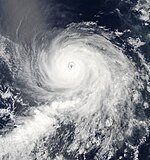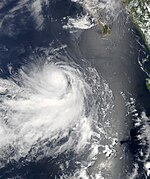2011 Pacific hurricane season
| 2011 Pacific hurricane season |

Season summary map
|
| Seasonal boundaries |
| First system formed |
June 7, 2011 |
| Last system dissipated |
November 25, 2011 |
| Strongest storm |
|
| Name |
Dora |
| • Maximum winds |
155 mph (250 km/h)
(1-minute sustained) |
| • Lowest pressure |
929 mbar (hPa; 27.43 inHg) |
| Seasonal statistics |
| Total depressions |
13 |
| Total storms |
11 |
| Hurricanes |
10 |
Major hurricanes
(Cat. 3+) |
6 |
| Total fatalities |
42 total |
| Total damage |
> $203.67 million (2011 USD) |
| Related articles |
|
|
Pacific hurricane seasons
2009, 2010, 2011, 2012, 2013
|
| Category 4 hurricane (SSHWS) |
|
|
| Duration |
June 7 – June 12 |
| Peak intensity |
140 mph (220 km/h) (1-min) 944 mbar (hPa) |
| Category 1 hurricane (SSHWS) |
|
|
| Duration |
June 19 – June 22 |
| Peak intensity |
90 mph (150 km/h) (1-min) 977 mbar (hPa) |
| Category 1 hurricane (SSHWS) |
|
|
| Duration |
July 7 – July 10 |
| Peak intensity |
80 mph (130 km/h) (1-min) 984 mbar (hPa) |
| Category 4 hurricane (SSHWS) |
|
|
| Duration |
July 18 – July 24 |
| Peak intensity |
155 mph (250 km/h) (1-min) 929 mbar (hPa) |
| Category 4 hurricane (SSHWS) |
|
|
| Duration |
July 31 – August 6 |
| Peak intensity |
140 mph (220 km/h) (1-min) 942 mbar (hPa) |
| Tropical storm (SSHWS) |
|
|
| Duration |
August 15 – August 19 |
| Peak intensity |
70 mph (110 km/h) (1-min) 992 mbar (hPa) |
| Category 1 hurricane (SSHWS) |
|
|
| Duration |
August 16 – August 21 |
| Peak intensity |
85 mph (140 km/h) (1-min) 979 mbar (hPa) |
| Tropical depression (SSHWS) |
|
|
| Duration |
August 31 – September 1 |
| Peak intensity |
35 mph (55 km/h) (1-min) 1002 mbar (hPa) |
| Category 4 hurricane (SSHWS) |
|
|
| Duration |
September 21 – September 30 |
| Peak intensity |
145 mph (230 km/h) (1-min) 942 mbar (hPa) |
The 2011 Pacific hurricane season was a below average Pacific hurricane season and was the first season since 2009 that featured no depressions or named storms in the month of May. It had six major hurricanes which was above average for a Pacific hurricane season. The season officially started on May 15, 2011, for the eastern Pacific, and started on June 1, 2011, for the central Pacific, both of which ended on November 30, 2011. These dates conventionally delimit the period of each year when most tropical cyclones form in the Pacific basin. A total of 11 named storms were observed, which is below average.
Despite the lack of storms, there were several intense and destructive storms this season. Hurricane Beatriz killed four people in Southwestern Mexico. Hurricane Jova killed eight and caused $203.67 million (2011 USD) in damage to Western Mexico. Tropical Depression Twelve-E killed 30 people in Central America. Meanwhile, Kenneth became the strongest November storm at the time. Hurricane Hilary brought additional flooding to Southwestern Mexico.
On May 19, the Climate Prediction Center released its pre-season outlook. The scientists stated a 70% chance of a below-normal season, a 25% chance of a near-normal season and a 5% chance of an above-normal season. The climatologists expected 9–15 named storms, with 5–8 becoming hurricanes, and 1–3 becoming major hurricanes. The accumulated cyclone energy was expected to be 45 to 105% of the median. The below-normal activity forecast was because of increased wind shear and a high expectation of El Niño-Southern Oscillation (ENSO)-neutral conditions (no El Niño or La Niña) throughout the peak months of July, August and September, together with lingering La Niña conditions at the beginning of the season.
...
Wikipedia



















